Nov 1, 2017
Sustainable Solano will be installing two demonstration food forest gardens in Fairfield at a private residence and one public location as part of its Sustainable Backyard program. The program aims to teach gardening techniques based on permaculture design principles (layered planting system that supports life) and wise water practices such as groundwater storage, roofwater catchment, and laundry-to-landscape greywater re-use. The expansion of these garden installation projects is funded by the Solano County Water Agency with the first project scheduled for 11/04, 11/11, and 12/16 at a private residential backyard.
This three-day installation will serve as a free, hands-on educational workshop open to Solano county residents. Attendees will have the opportunity to be a part of building the foundation for this garden by creating contour swales, building berms, planting fruit tree guilds and the installation of a laundry-to-landscape greywater system.
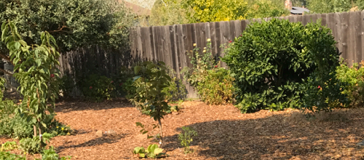
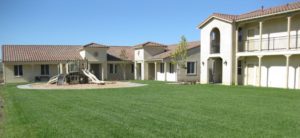
This holiday season, the program will also move forward with the creation of an edible “Christmas” food forest garden at Mission Solano, a transitional housing shelter that provides food, lodging, faith support and job training to over one hundred individuals and families in Solano County. Mission Solano sits on 3.5 acres with much of its land being underdeveloped making it an ideal location for a public demonstration food forest community garden. The demonstration garden will also include swales to capture rainwater, a laundry-to-landscape system, permaculture planting methods and will be open most Saturdays of the year for self-guided tours.
Mission Solano relies heavily on food donations and struggles with providing resident guests high-quality, nutritious food and access to fresh fruits and vegetables. A portion of food is purchased by the organization itself. Both partnering agencies saw an opportunity to not only reduce program food costs through this project, but to also serve the greater community by providing educational opportunities for Fairfield residents to learn about growing their own food, secondary water use and building resilient communities. On Saturday, 12/2 the public is welcome to attend a free greywater system installation workshop to learn how secondary water from your laundry and roof can feed an entire garden.
Most of the installation work and ongoing maintenance of this demo food forest garden will be completed by Mission Solano volunteers. The project is in in alignment with the agencies “job therapy” program that helps resident guests develop skills for future employment and sustainable living. Chief Operating Officer of Mission Solano, Shauna Hughes states, “By teaching our guests how to grow their own food, we can equip them to continue doing so once they establish permanent housing. This will help them overcome the barrier to good nutrition that most low-income residents face.”
Registration is required for all installation workshops for both public and private projects. Visit www.sustainablesolano.org/events to register.
The Sustainable Backyard program will expand to Suisun City next spring and to Vacaville in the fall of 2018. Sustainable Solano will be looking for both private and public lands to install food forests in these cities. Visit www.sustainablesolano.org and www.facebook.com/sustainablesolano for updates and details about this expansion.
About Sustainable Solano
Sustainable Solano a non-profit organization is a non-profit organization dedicated to Nurturing Initiatives for the Good of the Whole. For more information, email info@sustainablesolano.org or visit www.sustainablesolano.org.
Oct 2, 2017
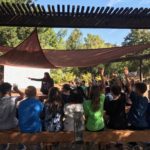
Eight graders chiming in on their future food forest design.
Kathleen, Larry and Elena taught a hands-on swale workshop to the Suisun Valley eighth graders in the spring of 2017 on how to use swales in storing rainwater in the ground. Now that the kids are back in school, designing the Demonstration Food Forest is the next step.
Principal Jas Wright is including the kids in the design of the food forest. To get them thinking about that design, I held five sessions, speaking with seven classes of, sixth, seventh, and eighth grade students. We had a conversation about Fruit Tree Guilds and the importance of choosing a diverse group of plants that benefit each other. Each plant should provide multiple functions.
The kids were engaged asking many questions. The one question that stood out in my mind: What is the opposite of a food forest? The answer is monoculture, the planting of only one type of crop in a given area. Our program encourages planting a polyculture and the importance of including plants that build the soil.
Fava beans have already been part of the Suisun Valley curriculum. Katie, one of the students was excited to tell me how they added nitrogen to the soil by planting fava beans as a cover crop. To prepare the demo garden site, Laura, the Garden Coordinator has already begun to sheet mulch. The site has two mature fig trees and an unidentified, mysterious fruit tree. These three trees will be included in the design.
Now the kids have a base understanding of what a fruit tree guild is. Each class will be responsible for the design, the installation and the care for one guild within the food forest. Over the next 2 weeks they will be naming their guilds and selecting the plants. On a side note, one of the classes is even working on restoring the California Native Plant Garden. So many opportunities to learn!
Sep 2, 2017
By Tina Saravia, U.C. Master Gardener, Solano County
It all started for me in September 2014, when I attended a talk on Permaculture in Benicia with another Master Gardener friend. I have heard of Permaculture for years, but it always seemed like a foreign concept to me. I did not know anyone, in my broad circle of urban horticulturally-inclined individuals, who practiced Permaculture. The fact that it was in Benicia, a 20- minute drive from my house, made it more real.

Permaculture Talk with Toby Hememway
What is Permaculture? Permaculture is a word originally coined by Bill Mollison and David Holmgren in the mid 1970’s to describe an “integrated, evolving system of perennial or self-perpetuating plant and animal species useful to man” (Holgrem Design. https:// www.holmgren.com.au/about-permaculture/). Permaculture is a design system based on ecological principles. The word originally referred to “permanent agriculture.” It has more recently expanded to stand for “permanent culture.”
Permaculture can be defined and explained in many ways. It encompasses many aspects. In its simplest form, it is a design system that can be adapted anywhere in the world, in any setting — urban, suburban or rural, no matter the size of the property. One of those design aspects that is easily adaptable is Food Forest Gardening, which is what the local grassroots organization, Sustainable Solano, started in Benicia.
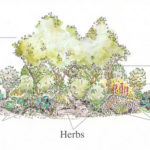 They help homeowners create their own sustainable food forest. The gardens feature edible plants in varying heights and sizes, mimicking a forest. The gardens use a combination of drip irrigation and greywater — laundry water. Swales or depressions, topped with wood chips, were dug to direct water from downspouts to also help water the gardens, which also helps refill the groundwater.
They help homeowners create their own sustainable food forest. The gardens feature edible plants in varying heights and sizes, mimicking a forest. The gardens use a combination of drip irrigation and greywater — laundry water. Swales or depressions, topped with wood chips, were dug to direct water from downspouts to also help water the gardens, which also helps refill the groundwater.
A few words about Sustainable Solano. It started out as Benicia Community Gardens. As the programs expanded beyond Benicia, the board decided to rename it Sustainable Solano in May 2016. They maintain a couple of community gardens, a community orchard, seven permaculture demonstration food forests, Community Supported Agriculture partnerships, a “Land Caretakers” sustainable landscaping education program, a food donation Share Plot, and a beloved monthly “What’s for Dinner?” educational cooking potluck series.
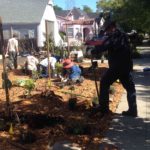 The most recent demonstration food forest installations were done in Vallejo, next is Fairfield. According to their website, sustainablesolano.org, they will be accepting applications starting in August through September for prospective demonstration food forest keepers in Fairfield.
The most recent demonstration food forest installations were done in Vallejo, next is Fairfield. According to their website, sustainablesolano.org, they will be accepting applications starting in August through September for prospective demonstration food forest keepers in Fairfield.





 They help homeowners create their own sustainable food forest. The gardens feature edible plants in varying heights and sizes, mimicking a forest. The gardens use a combination of drip irrigation and greywater — laundry water. Swales or depressions, topped with wood chips, were dug to direct water from downspouts to also help water the gardens, which also helps refill the groundwater.
They help homeowners create their own sustainable food forest. The gardens feature edible plants in varying heights and sizes, mimicking a forest. The gardens use a combination of drip irrigation and greywater — laundry water. Swales or depressions, topped with wood chips, were dug to direct water from downspouts to also help water the gardens, which also helps refill the groundwater. The most recent demonstration food forest installations were done in Vallejo, next is Fairfield. According to their website, sustainablesolano.org, they will be accepting applications starting in August through September for prospective demonstration food forest keepers in Fairfield.
The most recent demonstration food forest installations were done in Vallejo, next is Fairfield. According to their website, sustainablesolano.org, they will be accepting applications starting in August through September for prospective demonstration food forest keepers in Fairfield.
 Like with all of our educational programs, we believe in learning by doing, and we’ve already begun the long process–which in many ways is more meaningful to us and the children than the actual planting of the garden! The ground work has already started at the school! In May, Sustainable Landscaping Advisory Board members – Kathleen Huffman, Larry Lamoreux and Andy Zinkevich, – lead a workshop “Swales: Slow it, Spread it, Sink it” to two seventh grade classes of the school.
Like with all of our educational programs, we believe in learning by doing, and we’ve already begun the long process–which in many ways is more meaningful to us and the children than the actual planting of the garden! The ground work has already started at the school! In May, Sustainable Landscaping Advisory Board members – Kathleen Huffman, Larry Lamoreux and Andy Zinkevich, – lead a workshop “Swales: Slow it, Spread it, Sink it” to two seventh grade classes of the school.
 volumes of water, how to design simple water collection and diversion swales, and how to measure the levels in the soil. Outside, students were instructed on how to build a simple water collection swale (really an in-ground water tank–simpler and more effective than rain barrels) to collect and store the excess of water around the future food forest. Then it was time to get hands dirty. Kathleen, Larry and Andy were slightly terrified of so many children, all with shovels and with such high energy! But in no time, their youthful energy won over the day, and despite the 100-degree heat, all students were engaged, interested, and efficient. The school garden teacher, Laura Klein, will lead the team to finish the swale and fill it with wood chips before the school end.
volumes of water, how to design simple water collection and diversion swales, and how to measure the levels in the soil. Outside, students were instructed on how to build a simple water collection swale (really an in-ground water tank–simpler and more effective than rain barrels) to collect and store the excess of water around the future food forest. Then it was time to get hands dirty. Kathleen, Larry and Andy were slightly terrified of so many children, all with shovels and with such high energy! But in no time, their youthful energy won over the day, and despite the 100-degree heat, all students were engaged, interested, and efficient. The school garden teacher, Laura Klein, will lead the team to finish the swale and fill it with wood chips before the school end.
